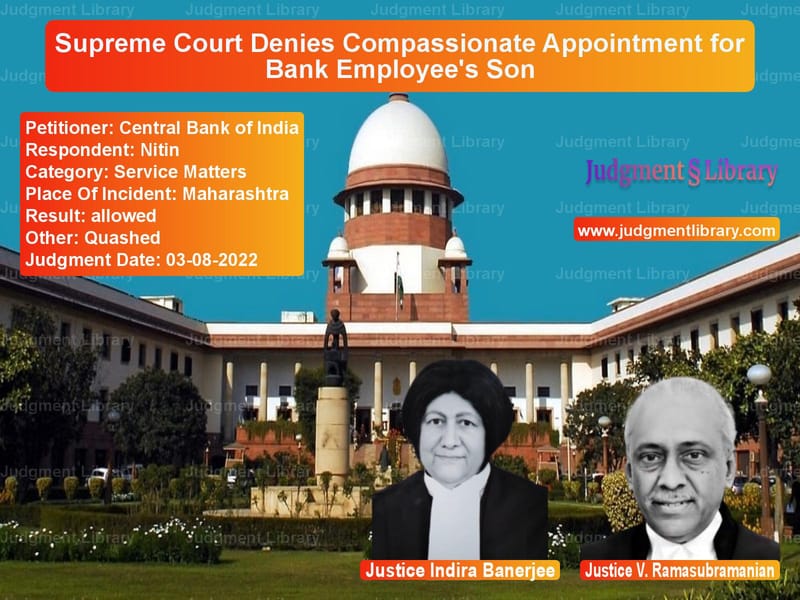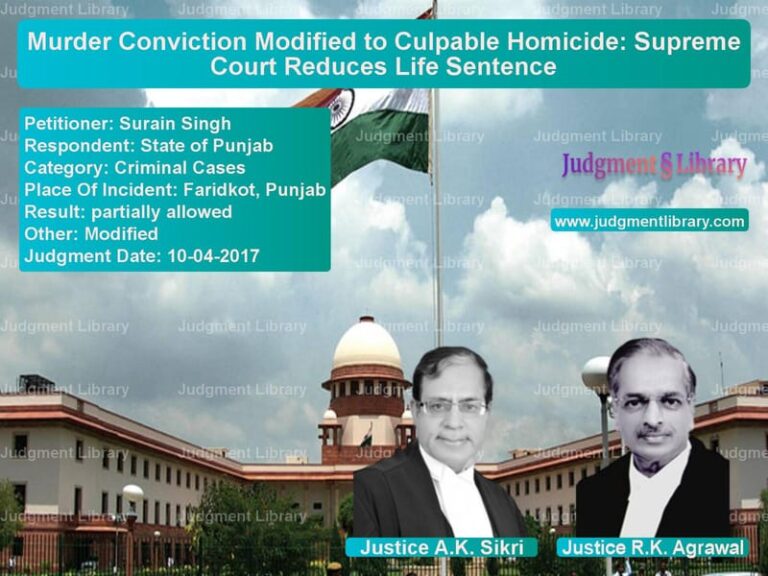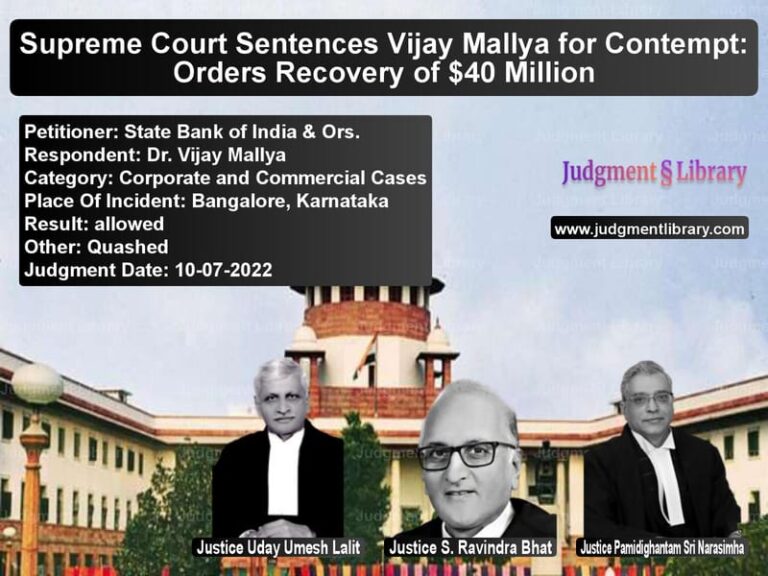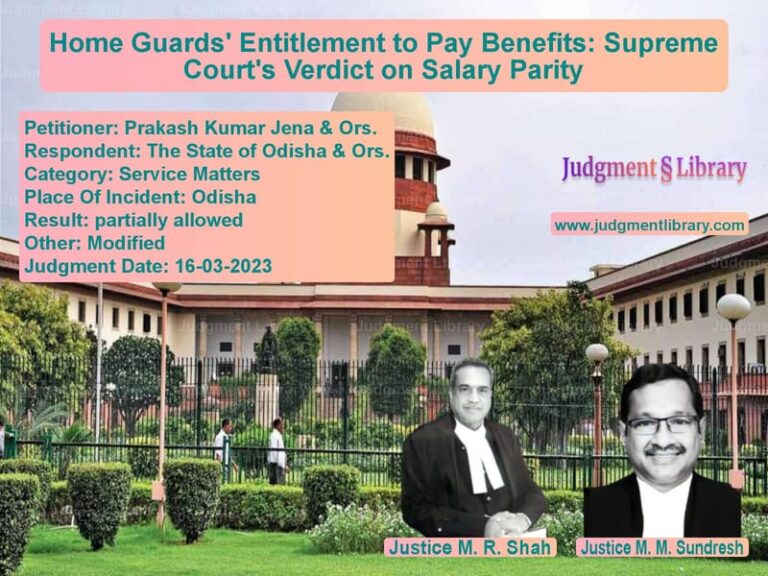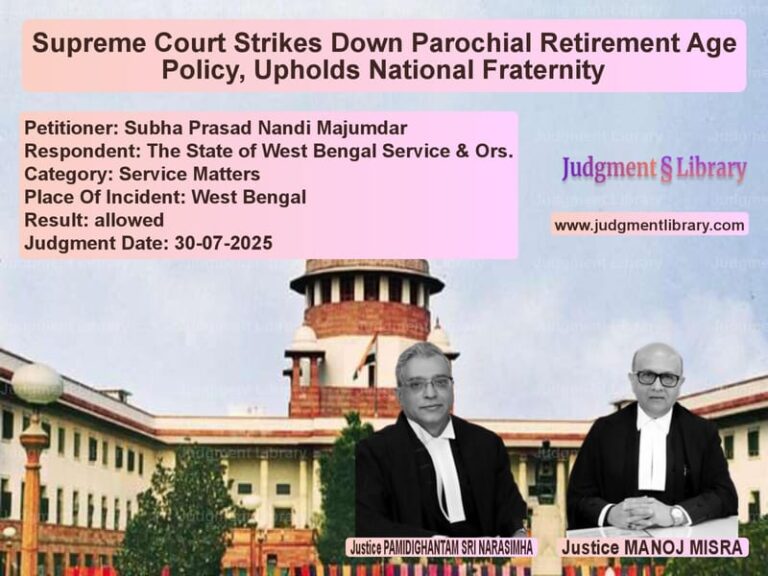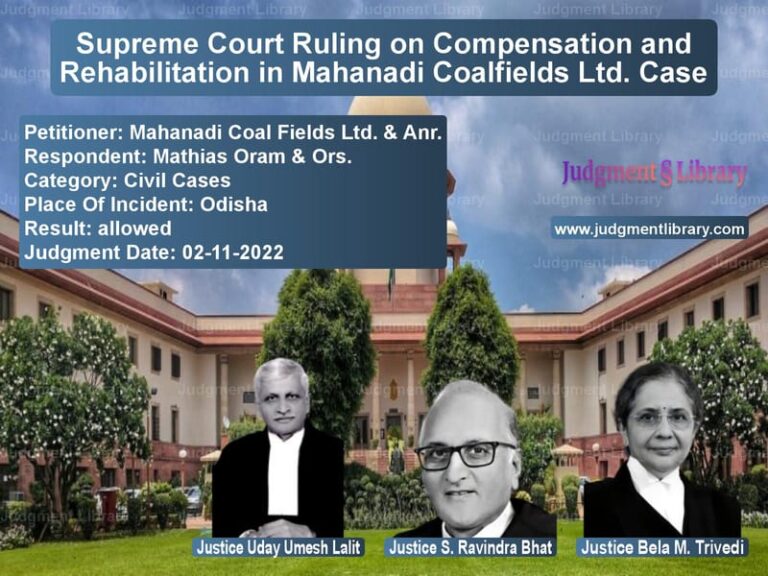Supreme Court Denies Compassionate Appointment for Bank Employee’s Son
The case of Central Bank of India vs. Nitin revolved around the question of whether a person is entitled to compassionate appointment despite financial stability. The Supreme Court was tasked with determining whether the Aurangabad Bench of the Bombay High Court erred in ordering the bank to consider the respondent’s case for compassionate appointment.
Background of the Case
The respondent, Nitin, was the son of Mr. Y.P. Arawade, who was employed as a Special Assistant in the Kolgaon Branch of the Central Bank of India. Due to medical incapacitation, Mr. Arawade sought voluntary retirement, which was granted on June 26, 2015. Following his father’s retirement, Nitin applied for compassionate appointment under the bank’s policy.
At the time of his application, Nitin was already employed as a Clerk in ICICI Bank Ltd. However, he did not disclose this fact in his application and misrepresented himself as unemployed. He later resigned from ICICI Bank in March 2016, eight months after submitting his application for compassionate appointment.
The bank’s Four Member Committee reviewed Nitin’s application in January 2018 and found that his family’s financial condition was stable. They were receiving a monthly pension of Rs. 25,110, had received retiral benefits of Rs. 27,05,766, and had investment returns of Rs. 3,70,442. Given that their estimated monthly income was Rs. 36,773, exceeding the 60% threshold of his father’s last drawn salary (Rs. 55,978), the committee rejected the application.
High Court’s Decision
The Aurangabad Bench of the Bombay High Court ruled in favor of Nitin, directing the bank to consider his case for compassionate appointment based on his seniority. The High Court relied on past Supreme Court judgments, including Canara Bank vs. M. Mahesh Kumar and Balbir Kaur vs. Steel Authority of India Ltd., to argue that financial stability should not be the sole reason for denying compassionate appointment.
Appeal Before the Supreme Court
Challenging the High Court’s decision, the Central Bank of India approached the Supreme Court, arguing that compassionate appointment is an exception to the regular recruitment process and should be granted strictly based on eligibility criteria.
Arguments Presented
Petitioner (Central Bank of India) Arguments
- The bank argued that compassionate appointment is meant to help families in financial distress after the death or medical incapacitation of an employee.
- It contended that since Nitin’s family had substantial financial stability, his case did not warrant compassionate appointment.
- The bank emphasized that its policy includes a financial criterion and that Nitin’s family exceeded the threshold.
- It pointed out that Nitin had suppressed his employment with ICICI Bank at the time of application, which was sufficient grounds for rejection.
Respondent (Nitin) Arguments
- Nitin argued that financial stability should not be the sole ground for rejection, citing previous Supreme Court rulings.
- He contended that he had a legitimate expectation of being considered for compassionate appointment based on his seniority.
- He claimed that the bank’s committee had wrongly calculated his family’s financial position.
Supreme Court’s Analysis and Judgment
The Supreme Court examined the bank’s compassionate appointment scheme and existing legal precedents. The Court reaffirmed that compassionate appointment is not a vested right but an exception granted under specific conditions.
Key Observations by the Supreme Court
- The Court held that financial stability is a valid criterion for denying compassionate appointment.
- It ruled that Nitin’s suppression of employment details was a material misrepresentation that justified the rejection of his application.
- It found that the High Court had erred in overlooking the bank’s policy, which explicitly set financial limits for eligibility.
- The Court clarified that compassionate appointment is not meant to provide employment to all dependents but only to those facing financial hardship.
Key Court Statement
“Compassionate appointment is an exception to the general rule of recruitment and cannot be granted as a matter of course. The financial condition of the family is a crucial factor that cannot be ignored.”
Final Judgment
- The Supreme Court set aside the Bombay High Court’s decision.
- It ruled that the bank’s rejection of Nitin’s application was justified.
- It emphasized that compassionate appointment must be granted strictly per policy guidelines.
Implications of the Judgment
This ruling has significant implications for compassionate appointments in public sector banks and government institutions:
- It establishes that financial stability is a legitimate ground for rejecting compassionate appointment applications.
- It reinforces that misrepresentation of facts can lead to disqualification.
- It upholds the principle that compassionate appointments should be granted only in cases of genuine financial distress.
- It provides clarity to public sector banks in handling similar cases in the future.
Conclusion
The Supreme Court’s decision in this case serves as a critical precedent in the area of compassionate appointments. By ruling in favor of the bank, the judgment upholds the integrity of recruitment policies and ensures that compassionate appointments are reserved for those who genuinely need them. The decision highlights the importance of transparency in applications and reinforces that such appointments cannot be treated as an alternative to regular recruitment.
Petitioner Name: Central Bank of India.Respondent Name: Nitin.Judgment By: Justice Indira Banerjee, Justice V. Ramasubramanian.Place Of Incident: Maharashtra.Judgment Date: 03-08-2022.
Don’t miss out on the full details! Download the complete judgment in PDF format below and gain valuable insights instantly!
Download Judgment: central-bank-of-indi-vs-nitin-supreme-court-of-india-judgment-dated-03-08-2022.pdf
Directly Download Judgment: Directly download this Judgment
See all petitions in Employment Disputes
See all petitions in Recruitment Policies
See all petitions in Public Sector Employees
See all petitions in Judgment by Indira Banerjee
See all petitions in Judgment by V. Ramasubramanian
See all petitions in allowed
See all petitions in Quashed
See all petitions in supreme court of India judgments August 2022
See all petitions in 2022 judgments
See all posts in Service Matters Category
See all allowed petitions in Service Matters Category
See all Dismissed petitions in Service Matters Category
See all partially allowed petitions in Service Matters Category

